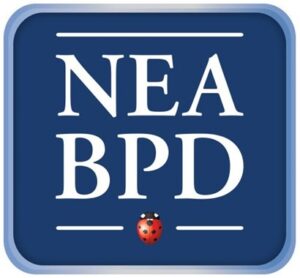FAMILY CONNECTIONS PROGRAM
Family Connections is a course designed by Alan E. Fruzzetti, Ph.D., and Perry D. Hoffman, Ph.D. for the National Education Alliance for Borderline Personality Disorder. It is a 12-session series for relatives of persons with difficulty managing their emotions. Regardless of the diagnostic “label”, rapid mood swings, anger issues, relationship problems, impulsivity, and self-injury are challenging to observe and deal with in a loved one.
Family Connections is focused on acceptance of “what is” in our lives and our loved ones’ lives with the objective of making our lives a little less stressful. The course also teaches skills to manage our emotions and our relationships. A significant part of the course is focused on learning and applying dialectical behavioral therapy (DBT).
Call the office at 508-778-4277.
FAMILY AND FRIENDS OF THOSE WITH BORDERLINE PERSONALITY DISORDER
Do you feel like you have to walk on eggshells around a family member? Or are you often asking yourself, “What just happened?” after an angry outburst? You are not alone.
These behaviors are often diagnosed as Borderline Personality Disorder
(BPD), a common illness affecting almost 6% of adults. Sometimes referred to as “Emotional Dysregulation,” people with BPD have problems regulating their emotions and thoughts which can lead to severe, unstable mood swings. They may also demonstrate impulsive behavior, have a poor self-image, and have a history of unstable relationships. Often referred to as “splitting”, someone with BPD may idealize a person one day, “He’s everything I ever wanted!” and devalue them the next, “I hate him.”
People who have BPD feel emotions intensely and for long periods of time. According to the NEABPD, one area the current research is focused on is how individuals with this illness have an inability to calm themselves after a stressful or emotional situation. Self-harm, such as cutting, suicide threats, and attempts are tragically very common for people with BPD.
In a 2007 study funded by the National Institute for Mental Health (NIMH), 85% of people with BPD also suffer from other mental illnesses such as major depression, substance abuse, bipolar illness, and self-injury. As a result, many people are not treated for BPD and the symptoms of self-harm, uncontrollable anger, irritability, and intense insecurity continue in spite of medication changes and hospitalizations.
Because both are mood disorders and the symptoms overlap, it is common for someone with BPD to be misdiagnosed with bipolar illness; however, there are important differences between these disorders. One difference is that with bipolar illness the mood changes generally last weeks or more. With BPD, the mood changes are much quicker, often fluctuating within a 24-hour period.
According to the NEABPD, those who seek treatment and remain actively engaged often respond well and find their lives dramatically improved. Dialectical Behavior Therapy developed by Marsha Linehan specifically to treat BPD is the most common form of treatment and involves individual skill training and group therapy.
Schizophrenia
Bipolar Disorder
Major Depression
Anxiety & Panic Disorders
Dual Diagnosis
Borderline Personality Disorder
OCD
Coping & Communication Skills
Medications & Brain Biology
Crisis & Relapse


